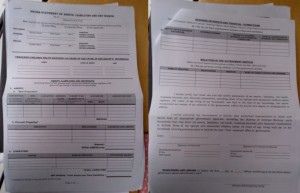Declaring dollar deposits would lead to double taxation, says former BIR exec
MANILA, Philippines—Declaring foreign currency deposits as required in the new Statement of Assets, Liabilities and Net Worth (SALN) form may not be a good idea for government officials and employees, a veteran tax collector claimed Saturday.
Estrella Martinez, an accountant and lawyer who spent 32 years with the Bureau of Internal Revenue, said a declarant would expose himself to “double-taxation” in the event he includes foreign currency deposits, stated in peso equivalents, in her or his SALN.
“You will be digging your own grave,” she told the Inquirer in a phone interview, the day after the Civil Service Commission released its new guidelines for the filing of SALNs for 2012.
Martinez said foreign currency deposits are already subject to a 7.5-percent final withholding tax under the Tax Code. Another provision in the same law imposes a separate 32-percent tax on the “increase in net worth,” she said.
Under the new CSC guidelines, “cash on hand and in bank, as well as stocks and the like, denominated in foreign currency shall be converted into the corresponding Philippine currency equivalent.”
Article continues after this advertisementThe conversion rate will be based on the “rate of exchange prevailing as of December 31 of the preceding calendar year.”
Article continues after this advertisement“At this juncture, the government employee is exposed to double-taxation under the Tax Code,” Martinez warned.
“Lamentably, if (foreign currency deposits) will be converted into peso denomination, there will be a tsunami of tax evasion (cases) since any increase in net worth is always taxable. Anybody can ask the old-timers in the BIR. Ignorance of the SALN law excuses no one from the tax consequences thereof.”
Martinez said requiring government employees to reveal dollar accounts in the SALN would also go against the Foreign Currency Deposit Act.
She cited a Supreme Court ruling that “enunciated a principle that if there are doubts in upholding the absolute confidentiality nature of bank deposits versus affirming the authority to inquire into such accounts, then such doubt must be resolved in favor of the absolutely confidential nature of foreign currency deposits.”
“Any exception to the rule of absolute confidentiality must be specifically legislated,” she added.
During his impeachment trial last year, former Chief Justice Renato Corona used the same argument in explaining why he did not declare some $2.4 million in bank deposits in his SALN. But senators sitting as judges in the quasi-political proceedings did not buy his arguments and convicted him.
Martinez said a declarant could “waive his right to absolute confidentiality” on his foreign currency deposits. But she said they should be included in the SALN only as a “parenthetical disclosure” so it would not unnecessarily jack up his net worth.
“If you convert the foreign currency deposit, your net worth will skyrocket,” she said.
Martinez said her position on the matter should not be misconstrued as assisting government officials in hiding ill-gotten wealth. “I’m just explaining the law. The law is there to be implemented,” she said.
All government workers, from President Benigno Aquino down to the lowest administrative aide, are required to submit their latest SALN on April 30 this year.
